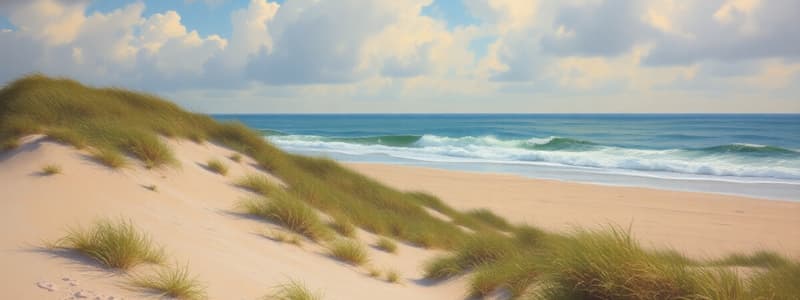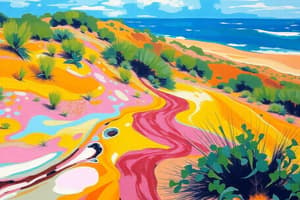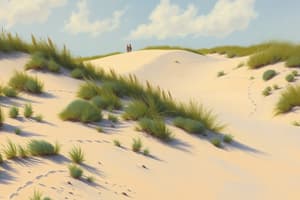Podcast
Questions and Answers
The strand line is a line of ______ found at the top of the beach.
The strand line is a line of ______ found at the top of the beach.
seaweed and litter
Embryo dunes are very ______ and can be easily washed away by high tides.
Embryo dunes are very ______ and can be easily washed away by high tides.
fragile
______ is a type of grass that stabilises the dune further.
______ is a type of grass that stabilises the dune further.
Marram grass
Yellow Dunes are made of ______, not soil.
Yellow Dunes are made of ______, not soil.
A ______ is reached when the dominant plant species is established and is at a state of equilibrium.
A ______ is reached when the dominant plant species is established and is at a state of equilibrium.
Flashcards
Embryo Dune
Embryo Dune
This is the first stage of dune formation. It forms when sand blown by the wind is deposited above the high water mark, often near obstacles like rocks or driftwood. Pioneer species, like prickly saltwort and lime grass, begin to colonize these young dunes, helping to stabilize them.
Foredune
Foredune
This dune forms behind the embryo dune as it grows. It's stabilized by the growth of marram grass, which helps bind the sand and prevents erosion.
Yellow Dune
Yellow Dune
This stage of dune development is characterized by a thin humus layer forming as marram grass dies off. The presence of humus and other organic matter allows different plants to flourish, creating a more diverse ecosystem.
Grey Dune
Grey Dune
Signup and view all the flashcards
Mature Dune (woodland)
Mature Dune (woodland)
Signup and view all the flashcards
Study Notes
Coastal Dune Succession
- Strand Line: Forms when the tide retreats, leaving dried sand that is then picked up by aeolian (wind) processes. This line, at the top of the beach, contains seaweed and litter.
Embryo Dune
- Young, very small dunes develop above the high-water mark, as sand carried from the strand line accumulates around obstacles like rocks or driftwood.
- Pioneer species like prickly saltwort and lime grass are among the first to colonize, further stabilizing the dune.
- These fragile dunes are easily eroded by high tides.
Foredune
- Forms behind embryo dunes.
- Marram grass significantly stabilizes the dunes and encourages other plant growth, leading to a more diverse ecosystem.
Yellow Dune (Semi-Fixed)
- A dune 10-20m high, composed of yellow sand.
- Sand accumulation slows as height increases and marram grass dies.
- A developing humus layer (organic matter) creates more soil, enabling a variety of plant species to grow.
- It is considered semi-fixed due to the balance between plant growth and wind activity.
Grey Dune (Fixed)
- Found further inland, where seawater is less frequent.
- Higher pH (neutral or slightly acidic) due to decreasing salt content.
- Support a greater variety of plant life, especially gorse and heather, which thrive in the developing soil.
- Significant soil improvement, creating damp, rich soil, and supports more flowering plants.
Mature Dune (Woodland)
- Represents the climax community, where the ecosystem reaches a state of equilibrium.
- Characterized by moist, nutrient-rich soil.
- Woodlands (e.g., pines and birch trees) flourish in this final stage of dune succession.
Studying That Suits You
Use AI to generate personalized quizzes and flashcards to suit your learning preferences.




